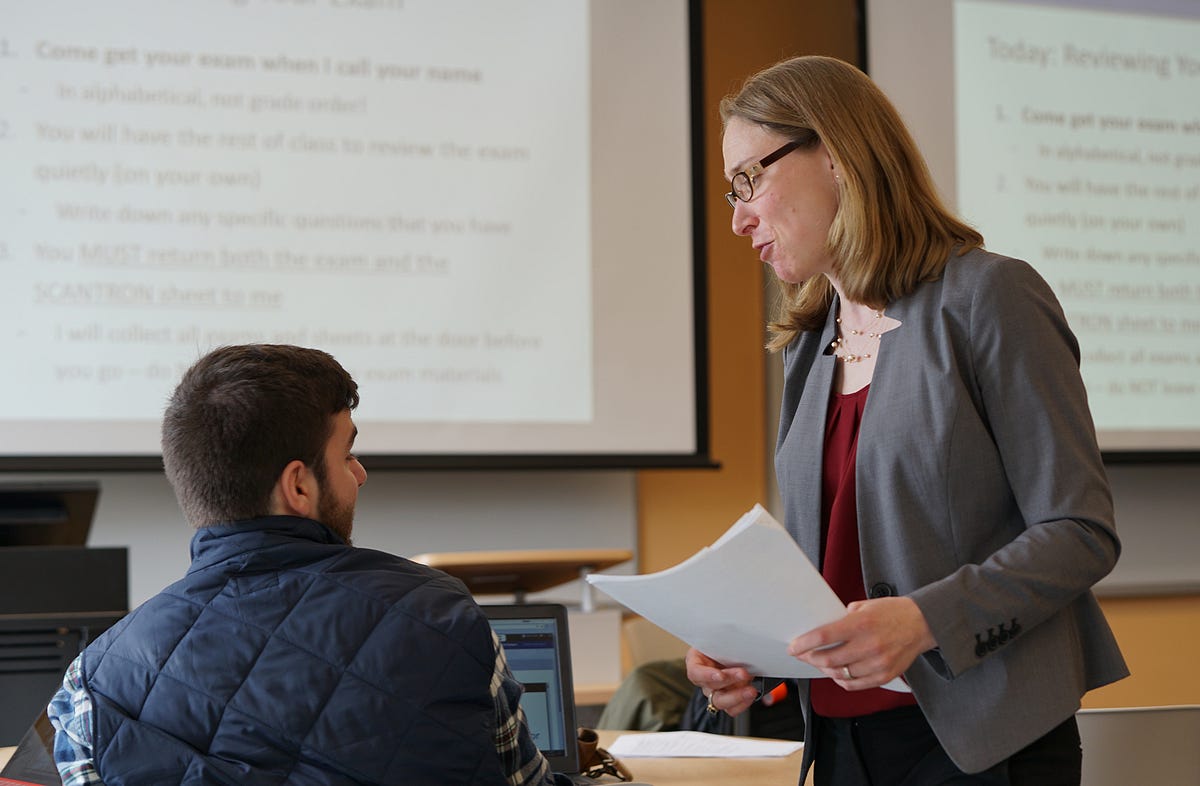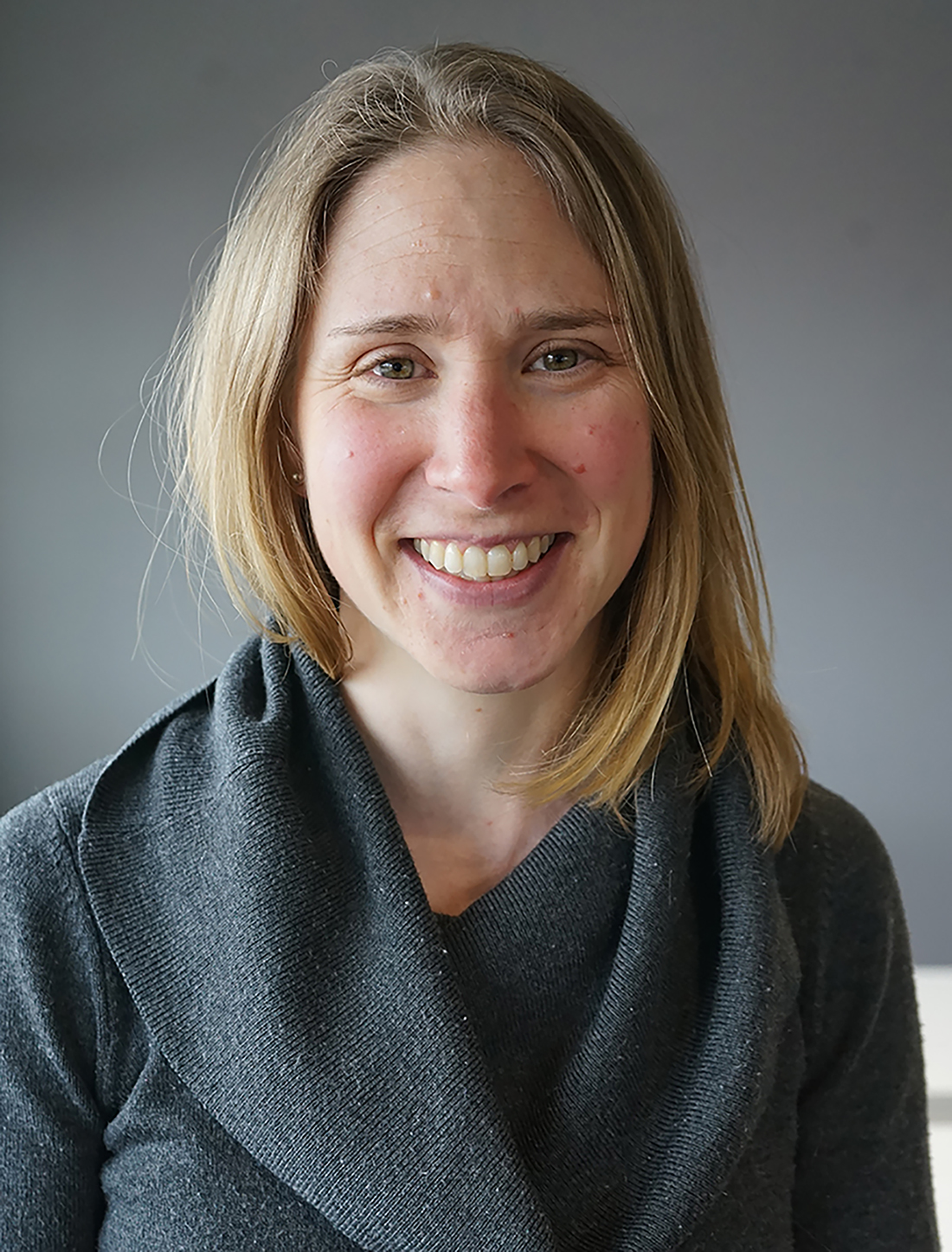If I am struggling to make progress on writing a research article, I switch to making PowerPoint slides for my next class. That way, I still get work done that needs to be done, rather than spinning my wheels stubbornly on something that isn’t going well.
People often think that incorporating mindfulness requires a huge time commitment, which makes it seem impossible given that they already feel rushed. But taking even five minutes a day to breathe mindfully is helpful in terms of reducing stress and generating new energy.
As a part of my series about “How to Slow Down To Do More” I had the pleasure to interview Elana Feldman, Ph.D. Elana is an assistant professor of management in the University of Massachusetts Lowell’s Manning School of Business, whose research focuses on how the temporal and relational elements of organizations shape people’s experiences, work and personal development. At UMass Lowell, she teaches courses in organizational behavior in addition to conducting research, and has received numerous honors for excellence in both. Prior to her career in higher education, she worked as a consultant and market analyst in the biotechnology and pharmaceutical industry, as well as in talent management and leadership.
Can you tell us the “backstory” about what brought you to this specific career path?
When I was working for a consulting firm right after college, I noticed that people thought that working longer hours showed you were a better employee. This seemed strange to me, since I was convinced that working more did not make you more effective. So, I became interested in how time is often used as a proxy for performance, and in the problems this causes for companies and the people working for them.
According to a 2006 Pew Research Report, 26% of women and 21% of men feel that they are “always rushed”. Has it always been this way? Can you give a few reasons regarding what you think causes this prevalent feeling of being rushed?
Although workers have experienced time pressure since the Industrial Revolution, people feel more time-related stress than they did in the past. First, communication technologies keep people connected to their work, so they constantly notice new tasks and messages that they feel they need to address, even when they are technically not working. These technologies have also created a culture of urgency: People believe they must reply to messages immediately and see response speed as a reflection of their competence. And communication technologies have, of course, increased the number of interruptions people experience, with work and personal distractions making it hard to focus on and complete tasks. Second, many people are now doing work that is hard to predict or control. Creative and knowledge workers are often assigned projects that move along more slowly than projected, or that take unexpected turns, and this can make them nervous about whether they will be able to complete those projects on time. Finally, compared to previous eras, more households have two adults who work, or a single parent who works full time. Employees are therefore not only scrambling to get their work done in time to pick up kids, but also managing the complex network of child care and other forms of support that many households depend upon.
Based on your experience or research can you explain why being rushed can harm our productivity, health, and happiness?
Although reasonable deadlines and time pressure motivate people in a positive way, feeling rushed all the time can affect people’s mental and physical states adversely. People may experience physiological changes, such as rises in blood pressure and heart rate, and “negative” emotions like anxiety and stress. People’s work often suffers, too. Over time, as people feel burned out, they invest less energy in their tasks. Feeling rushed can also hinder creativity. People may close down new avenues of thinking too quickly — or ignore novel opportunities — as they sprint to meet tight deadlines. This can result in incremental rather than radical innovation.
On the flip side, can you give examples of how we can do more, and how our lives would improve if we could slow down?
Slowing down requires identifying what is most important and focusing on those things. Doing this allows people to work on fewer things at a time, which is actually more efficient in the long run. People feel most satisfied about their workday when they make progress on meaningful tasks, so companies should think about how to help their employees do just that. This may mean rethinking the frequency of meetings, the use of internal messaging platforms (like Slack) and the design of office spaces. In short, companies and individuals both need to be more thoughtful about how and when they do their work and question whether their current strategies are effective. Changing work policies or communication norms can definitely help people feel less rushed, with positive changes in employee well-being, commitment and creativity.
We all live in a world with many deadlines and incessant demands for our time and attention. That inevitably makes us feel rushed. Can you share with our readers 6 strategies that you use to “slow down to do more”? Can you please give a story or example for each?
1. I control the notifications and information that I get. For instance, I do not get alerts when new emails arrive and I do not have my personal email account set up on my work laptop.
2. I acknowledge that I cannot work for eight hours in a row. When I feel my brain getting tired, I step away from my work. If I am at home, I may put a load of laundry in the washing machine. If I am in the office, I may walk with a colleague to get coffee. After letting my brain recover, I can return to my work with new energy and ideas.
3. I intersperse easier tasks with brain-heavy ones. For instance, if I am struggling to make progress on writing a research article, I switch to making PowerPoint slides for my next class. That way, I still get work done that needs to be done, rather than spinning my wheels stubbornly on something that isn’t going well.
4. I try to say “no” some of the time. I get asked to do a lot of things and I cannot do them all. So, if I get asked to help run a conference, I consider how that role relates to my main responsibilities, and turn it down if it does not seem relevant or interesting. My work colleagues and I also remind each other to say “no” and help each other figure out how to do that graciously.
5. I try not to mix work into my family time. When I am with my children, I generally do not check my work email and try instead to focus on what is happening in front of me. Smartphones make this tough, but I find that checking my work email when I am really not in a good position to answer it increases my work stress and distracts me from the current moment.
6. I try to exercise almost every day. It is easy to ignore movement when work and the rest of life are so busy, but I manage to fit in some type of exercise five to six days per week. It feels like a tough tradeoff, between work time, family and exercise, but I am ultimately happier, healthier and more productive.

How do you define “mindfulness”? Can you give an example or story?
Mindfulness is about noticing your reactions and emotions, without judging them. Ideally, practicing mindfulness consistently can help you rewire your brain to reduce feelings of time pressure. For instance, if I get an email asking me to take on another task, instead of immediately jumping into it and feeling time-crunched, I can pause to notice my reaction and then realize that I do not actually need to deal with the new task right away.
Can you give examples of how people can integrate mindfulness into their everyday lives?
People often think that incorporating mindfulness requires a huge time commitment, which makes it seem impossible given that they already feel rushed. But taking even five minutes a day to breathe mindfully is helpful in terms of reducing stress and generating new energy.
Do you have any mindfulness tools that you find most helpful at work?
For me, taking time to close my eyes and pay attention to my breathing is most helpful. Sometimes, it can also be useful to get outside for a few minutes and focus intentionally on something, like the sky. (Stretching is also something that helps me re-center, but I know not everyone has an office space that allows for that!)
What are your favorite books, podcasts, or resources that inspire you to use mindfulness tools or practices?
A number of years ago, I took an eight-week course on “Mindfulness-based stress reduction (MBSR)” at the UMass Medical School Center for Mindfulness. It required a large time commitment, but I highly recommend it. It gave me the foundation I need to return to mindfulness in smaller doses now that my life is even busier. Certified teachers offer a similar course in different locations worldwide.
Other resources: Online short meditations, such as those at https://medical.mit.edu/community/sleep/resources. I also have a meditation app on my phone that I can set to remind myself to take breaths. Many similar apps are free.

Can you please give us your favorite “Life Lesson Quote”? Can you share how that was relevant to you in your life?
I don’t really have a favorite life lesson quote, per se. However, I live near the famous, beautiful Mount Auburn Cemetery and I love one of the headstones there. It simply says “She Tried.” To me, this saying captures the essence of slowing down. All you can do is try; you cannot guarantee where you will end up. (The headstone is for Elizabeth Hunter Morrill.)
You are a person of great influence. If you could inspire a movement that would bring the most amount of good to the most amount of people, what would that be? You never know what your idea can trigger. 🙂
Standard six-hour work days for all (without reduced pay).
Thank you so much for these insights! This was so inspiring!
About the Author:
After 15 years working in Commercial Real Estate in New York City, Ashley Graber changed the coast she lived on and the direction of her life from Real Estate to the worlds of Psychology and Meditation & Mindfulness. Ashley came to these practices after getting sober and in the decade plus since, she now runs a busy mindfulness based psychotherapy practice in Santa Monica, CA where she see adults and young children. Ashley unique combination of psychotherapy, trauma reprocessing and meditation and mindfulness practices makes her a sought after educator and speaker. She educates teachers and administrators in schools and presents in businesses on the benefits of meditation and mindfulness practices
Ashley is also an Owner and Director of Curriculum for the next generation meditation app & mindfulness company ‘Evenflow’ and launched the company’s one to one online mindfulness mentoring program.
Ashley was trained in Meditation and Mindfulness practices by prominent teachers; Elisha Goldstein, Richard Burr and Guiding teacher at Against the Stream Boston, Chris Crotty. Her Mindfulness Based Stress Reduction (MBSR) certification was done through The Center for Mindfulness at UC San Diego. Additionally, Ashley is trained by Mindful Schools to teach Meditation and Mindfulness practices to children and families. Ashley’s passion for the benefits of mindfulness practices as well as her enthusiasm for helping young kids and adults is the drive to teach these very necessary, life long skills and why she wrote and runs the Mindfulness for Families program at The Center for Mindful Living. This is where she teaches groups of families with children ages 6–12.
Ashley was featured on Good Morning LaLa Land, presented on Resilience at the renowned Wisdom. 2.0 Mindfulness & Technology conference, and presented at the TED Woman conference offering an in-depth look at the profound psychological and physiological consequences of chronic stress, and how meditation and mindfulness practices can alleviate these effects. Ashley is also a syndicated columnist for Thrive Global and Medium Magazines.
If you’d like to book Ashley for an inspiring speaking engagement, please click here.


